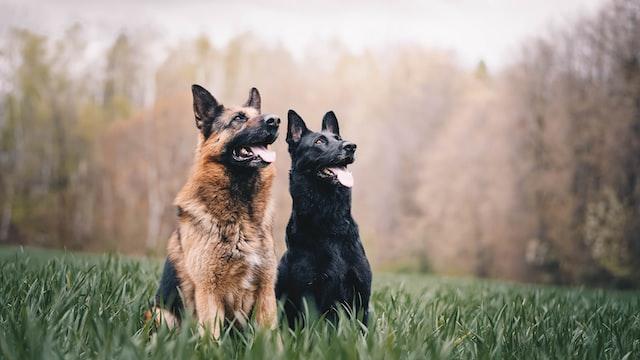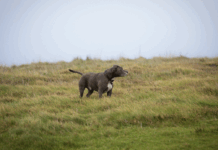Last Updated on November 21, 2022 by Dogs Vets
German Shepherds — Important Facts
Are you ready to choose one among a bunch of gorgeous German Shepherd puppies? They’re one of the most loyal dogs you can find—but just like any other breed, you need to know how to take care of it properly.
They have plenty of fun (and some less fun) quirks, and we’ll tell you about some of the most important ones right here!
Get Ready For A Lot Of Grooming
German Shepherds are truly beautiful but require plenty of attention and grooming. Get ready to brush them at least once a day. And speaking of brushing, also bear in mind that they shed all year long; but truly “change coats” in the spring and fall.
In practice, this means you’ll have plenty of grooming on your hands once their undercoat starts shedding.
The process lasts about two weeks, but don’t worry—you can find guides on how to reduce their shedding somewhat.
Make sure you have a proper grooming tool, and one that’s specifically made for German Shepherds, something that easily makes its way through their topcoat and removes any loose hair safely.
If you can, don’t skimp on these tools — cheaper brushes won’t do the job with such a rich coat.
Loyalty And Protection
One of the reasons why so many people choose German Shepherds is their awesome personalities. They’re the quintessential protective watchdogs and are famous for their extreme and unwavering loyalty.
If you work on building a decent relationship with them, they’ll never fail to protect you against approaching strangers or malicious intruders.
That’s why they’re such popular family dogs, especially in rural areas. It’s no wonder; as their name suggests, German Shepherds were first bred to help herd livestock and sheep. They’ve got loyalty and obedience in their genes—making them famous police dogs as well.
Relations With Other Dogs
It’s worth bearing in mind that the loyalty displayed by German Shepherds has a flip side as well; they’re prone to territorial and aggressive behavior, especially towards fellow dogs.
That’s why they need plenty of socialization and careful training. Otherwise, they’re quick to behave aggressively when other dogs or people make them feel anxious or fearful.
Ideally, these pups shouldn’t be separated from their littermates or mother too early. This is crucial for helping them master bite inhibition.
Otherwise, they’ll keep biting because they won’t know it’s not an acceptable way to behave.
When you take your German Shepherd puppy home for the first time, make sure they start socializing with people and dogs immediately. That way, their social and behavioral development will continue with minimal interruptions.
Lifespan
Naturally, we want our pets to live happy and long lives, preferably without difficult health issues. This is especially important for your first puppy; you learn as they grow. With that in mind, you’ll be pleased to learn that German Shepherds live around 10-13 years on average; of course, as long as they receive proper nutrition and exercise.
Don’t underestimate the importance of a dog’s nutrition — they need high-quality meals to maintain their overall health and ensure longevity. Before the puppy arrives, learn more about the types of food they can’t eat or should eat.
German Shepherd Training
Of course, it’s never a good idea to take dog training lightly. After all, teaching another being (with which you can’t verbally communicate) about social and improper behavior is probably more complicated than you think.
Luckily, German Shepherds are more intelligent than most dogs, which makes their training a bit less difficult.
Maintaining a consistent training routine is the most important thing with these doggos. As long as you continually reinforce proper behavior and dedicate enough time and energy to the process, you’ll have a well-behaved and loyal German Shepherd.
These days, there are plenty of professional dog trainers who can help you out. Plus, countless YouTube channels and online guides can take you through ethical dog training methodologies.
You’re doing a great job as long as your pup is happy and learns what type of behavior to avoid.
Hip Dysplasia
Unfortunately, every dog breed has some particular health problem. And in the case of German Shepherds, it’s most commonly hip dysplasia.
It’s a hereditary condition that can be pretty painful, resulting from loose or incorrectly developed joints. Sometimes, it leads to osteoarthritis.
This condition is just one of the reasons why you should learn all you can about your dogs before you start caring for one of them.
Specific amounts and types of exercise can aggravate this problem — along with obesity and improper nutrition.
Luckily, certain treatments can alleviate the symptoms of hip dysplasia, at least in the not-so-severe cases. Some joint supplements help, like anti-inflammatory drugs and glucosamine.
Naturally, this is something to check with a professional veterinarian; don’t try to diagnose or treat anything yourself.
Facts Check
We hope you enjoyed this article… What are your thoughts?
Please feel free to share this article!























